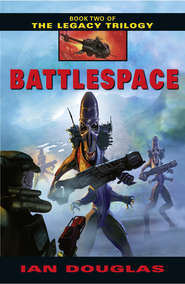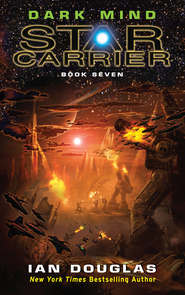По всем вопросам обращайтесь на: info@litportal.ru
(©) 2003-2024.
✖
Star Marines
Настройки чтения
Размер шрифта
Высота строк
Поля
A giant’s hand slammed down on Garroway’s chest, pressing him back into the thinly padded seat. The AUTs—like the Preble, and like most human-crewed spacecraft nowadays—made use of Oannan drivefield technology, but that only reduced the effects of inertia, allowing higher accelerations and more violent maneuvering than would otherwise be possible with a human payload. The effects of acceleration were still felt, and they were still unpleasant.
The autie boosted hard for two minutes before the blessed relief of zero-G again enfolded him.
“C’mon!” one Marine griped over the platoon channel. “When do we get to see where we’re going?”
“Belay that,” Garroway snapped. Every Marine on the autie was keyed to the breaking point. It was the platoon gunnery sergeant’s job, his job, to make sure they didn’t actually snap. “When they have a feed, they’ll give it to us. For now, keep hitting your weapons checktext. Ooh-rah?”
“Ooh-rah.” But the response was scattered and weak.
In fact, the team had been over its weapons and equipment checks time and time again already. They were as ready as they could be … as ready as any military strike force could be flying blind into an unknown tactical situation.
“How about it, Lieutenant?” he asked, using the private command channel. Wilkie was on board the autie, though he wasn’t on the cargo deck with the rest of the Marines. As CO of the op, he would monitor things from a console-couch in the AUT’s cockpit. “They haven’t told us a fucking thing. Right now, morale sucks and our performance is going to suffer for it. When do we at least get to see where we’re going?”
“Like you just told them, Gunny,” Wilkie said. “When they decide to give us something to look at. In the meantime, we have to be patient.”
“Yeah, yeah, yeah, ‘patience,’” Garroway replied, falling back on an old joke. “How long will that take?”
Wilkie didn’t reply, however.
Garroway was concerned about the lieutenant. He was almost as new to the Marines as Lowey, Atkins, and a couple of the other newbies were. According to the man’s personnel files, he’d commanded a platoon Earthside out of Annapolis, but that had only been for three months, until he’d been assigned to SCS, Space Combat School. After that, he’d been sent straight to RST-1, and that had been just two months ago. Garroway had no doubts whatsoever about Wilkie’s technical qualifications. But he did wonder about his ability to lead Marines. In his two months with the RST, Wilkie had seemed … remote, somehow. Nothing Garroway could really put on the table and criticize, but his abrupt manner was worrisome, sometimes. Distracted. And inflexible. A good Marine officer textened to his senior NCOs carefully, even let himself be guided by them. Wilkie, somehow, seemed driven by his own agenda, with a single-mindedness that had won him the nickname “Will-kill.”
The joke was that no one knew who his single-mindedness would kill—the enemy, or the Marines under his command.
But that was outside of Garroway’s control. A good platoon gunny got his people through all kinds of obstacles and problems—including those presented by obstinate or know-it-all junior officers.
Damn it, though, this time it was worse than usual. No information was coming down from the top … and that made Garroway’s job a hell of a lot tougher.
The minutes dragged by, as stress—measured by the bio readouts for each member of the platoon—grew to near-intolerable levels.
Only in the last couple of minutes did the Marines see what was awaiting them.
The datafeed, according to the peripheral alphanumerics, was coming from an unmanned drone approaching the Intruder. That, he thought, is why the delay. We didn’t have anything close enough to send us a picture.
The alien was definitely a twin of the Xul starship that had come through the stargate at Sirius a century and a half ago—two kilometers long, a slender needle forward, gently swelling into bulges and protuberances of unknown purpose farther aft, the whole gleaming gold in the weak light of a distant Sol.
And—the God of Battle be praised—it looked dead.
Looked. That was the operative word. The HELGA lasers had slashed into the rear quarter of the ship, leaving that end raggedly truncated and surrounded by a slowly expanding cloud of dust, frozen mist, and debris. Much of the golden hull forward was scorched and blackened.
Still, he’d studied recordings made at the Battle of Sirius, and this didn’t look as bad as the damage that had taken out the other Hunter vessel. The Marines would have to assume that whatever passed for crew over there were very much alive and ready to defend their property.
Garroway heard the mingled comments of several of the watching Marines.
“Jesus! Look at the size of that thing.”
“Hey, Cowboy. Size doesn’t matter. You should know that!”
“What are we gonna do … fly up its ass?”
“You got a better way to goose that bitch?”
Abruptly, the image winked out, raising an angry chorus of complaints and grousings.
“Hey! Who turned it off?”
“Let us see, damn it!”
“Texten up, people,” Wilkie said over the platoon channel, overriding the grumblings. “They just passed the word that they’re going to trigger two XELs in a minute. It’ll be like a preliminary bombardment, giving us some cover going in. They switched off the drone’s feed to save its optics.”
The grumbling abated somewhat, but not entirely. For Garroway, though, that was good news. Hitting the Xul intruder again, moments before the RST boarded it, might make the difference between survival and death.
And if we’re real lucky, he thought, they’ll overdo it and the damned thing will be vaporized! He found he didn’t mind at all the possibility that this operation would be aborted at the last minute.
Battlespace
1443 hrs, GMT
The X-ray laser platforms in extended orbit about Mars were under the control of an artificial intelligence named Artemis. She was, in fact, a software clone identical in most respects to Kali, who was handling the long-range targeting of the Xul intruder at HELGA Three, but she was resident in the military computer network that embraced Mars, Deimos, and Phobos, as well as several of the warships currently within a few light-seconds of the Red Planet.
Her name was apt. In Greek mythology, Artemis was half sister to Ares, the God of War who became Mars when the Romans acquired him, and she was a huntress, expert with the bow. Artemis wasn’t using a bow now, of course, but she was having to take very careful aim at a target several light-seconds distant … which meant she had to take into account the target’s residual velocity of several kilometers per second relative to the planet.
The XEL satellites could deliver only a fraction of the energy yield of a single HELGA shot, but every indication seemed to suggest that the Xul ship’s energy screens were down. If so, Humankind might have just lucked out; XELs were designed to vaporize mountain-sized boulders on an intercept course with Earth, or at least vaporize enough of them that they were nudged, hard, into a new path.
Artemis was about to nudge the Intruder … hard.
Her targeting task was made more difficult by the fact that the XELs were on opposite sides of Mars, and separated by almost two light-seconds. Artemis had to time the triggering as well as take into account the time it would take the bursts of X-ray energy to reach the target. For optimum effect, one X-ray laser pulse should hit the target no less than half a second after the other.
She was also at a disadvantage because there was only one drone within imaging range of the target right now, and she’d just switched that off in order to give her something by which to make a damage assessment after she fired.
Like the expert software system that she was, Artemis took all into account, made the necessary calculations—adjusting even for the slight bend in space created by both the Arean gravity well and the much smaller gravity well created by the black hole inside the target’s drive system. She delayed the shot as long as possible so that the Marine shuttle now approaching the target would enjoy the maximum effect, but not so long that she risked catching the AUT in the two beams of coherent X-rays.
At precisely the appointed moments, the two XELs detonated in nuclear fury, a hair over a second apart. In each, a 10 megaton fusion explosion generated an intense pulse of X-rays, which were shaped into coherence and given an aim point by powerful magnetic fields a stark instant before the generators of those fields were vaporized.
Two pulses of X-ray energy, each a tenth of a light-second long, flashed across intervening space. Both were invisible, both due to the airlessness of space and to the fact that X-rays are invisible to the human eye, but at the last instant both showed as dazzlingly bright threads of light as they seared through the cloud of dust and gas now surrounding the target. For another instant, though no one was present to see it, an intolerably brilliant point of light dazzled off the Xul ship’s side.
One point. The other shot had missed. Even the best AI expert system wasn’t perfect.
But when Artemis switched on the drone image feed again, it was clear that the first shot had hit, and with good effect. The target had not vaporized, unfortunately … but it had been badly holed amidships.
Artemis transmitted a brief signal to the approaching AUT. “You are clear to board.”
The Marines were going in.
6
12 FEBRUARY 2314
Assault Detachment Alpha











